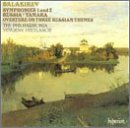| All Artists: Balakirev, Svetlanov, Phl Title: Russia / Tamara Members Wishing: 0 Total Copies: 0 Label: Hyperion UK Release Date: 11/23/1993 Genre: Classical Styles: Forms & Genres, Theatrical, Incidental & Program Music, Historical Periods, Modern, 20th, & 21st Century, Symphonies Number of Discs: 2 SwapaCD Credits: 2 Other Editions: Liszt: The Canticle of the Sun UPC: 034571166919 |
Search - Balakirev, Svetlanov, Phl :: Russia / Tamara
CD Details |
CD ReviewsLiszt the Celestial Hexameron | 07/07/2007 (5 out of 5 stars) "Volume 25 in the Hyperion Liszt series introduces piano music borrowed from other compositions: the numerous transcriptions of various motets, choral pieces, and songs are representative. In addition, Howard has also recorded the solo piano version of Liszt's profound and last symphonic poem, "From the Cradle to the Grave." The quality of music and the impact of this piano version are largely responsible for my five star review. And yet Liszt's poetic piano arrangement of the "Cantico del Solo di San Francesco d'Assisi" is another blockbuster.
Liszt's passion for the Saints is evident in his two piano pieces, the Legends. Howard explains, "The Fioretti (Little Flowers) of St. Francis of Assisi was amongst Liszt's favourite inspirational and devotional readings, and it is The Canticle of the Sun from that book which provides him with the text for the choral version of the Cantico del Sol." Liszt changed the title in his piano version to "Cantico di San Francesco," and the work is a fervid and serious one. The booming opening hymn in the bass leads to a majestic thread of meditative ideas and passionate outbursts. Howard describes the work simply as "a paean of joy." Indeed, along with the counterpart piece, "Preludio," Liszt explores his own spirituality and religious zeal, best supported by the delicate and virile dynamics of the piano. Liszt's thirteenth and last symphonic poem, "From the Cradle to the Grave" was written in 1881 and is one of those rare post-Weimar years' orchestral works. The philosophical meaning and nature of this last symphonic poem is decidedly somber. Humphrey Searle reports that the work "was inspired by what is apparently a very bad painting by Count Michael Zichy, and is divided into three parts, 'The Cradle,' 'The Struggle for Existence,' and 'To the Tomb: the Cradle of the Future Life.'" Liszt's orchestral version is visceral, but as always with Liszt's piano-writing, melodic fragments and individual lines of music reveal themselves better in his piano transcriptions. This piano version, I think, illustrates Liszt's pensive ideas quite well. The last portion in particular, "To the Tomb: the Cradle of the Future Life," sounds exalted in the piano's registers. The music itself plunges a dichotomy of depths: the funereal mood of death and the mysterious voyage of the afterlife. Although this is the only piano recording of this symphonic poem, I believe Howard's playing is noble and directed with careful pacing and dynamics. No less significant than the two major works mentioned above are the smaller piano pieces derived from other choral compositions and songs. Both versions of "O Sacrum convivium" percolate with beautiful quietude, while the "Ave maris stella" is a wonderful pianistic treatment of a simple plainchant. There are other pieces here, however, that could be safely labeled "secular," and one of the finest is "Il m'aimait tant," a transcription of Liszt's own song, "which tells of the grief of love lost after a broken tryst." Clothed in Liszt's melancholic lyricism and Romantic sentiment, the piece is simply lovely. Another worthy transcription is the brief but even more effective song, "Ich liebe dich," played with heart-felt ardor by Howard. The "Romance" and "Die Zelle in Nonnenwerth" have been recorded elsewhere in their other versions, but offer new angles to familiar music content. Bottom line: The absence of reviews for this Hyperion release is sad and the degree of quality these pieces exude can't be emphasized enough. The piano versions of the "Cantico del Sol" and Liszt's abstract "From the Cradle to the Grave" are celestial and imposing works. And in the various piano versions of motets and songs, Liszt displays a prolificacy that never ceases to be astonishing." |

